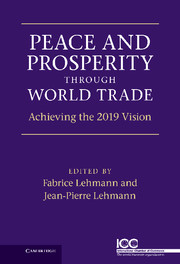Book contents
- Frontmatter
- Contents
- Notes on contributors
- Foreword
- Preface: the ICC vision
- Historical overview and dynamics
- Editorial note
- A Global systemic transformations
- B Governance of global trade
- C Poverty and global inequities
- D The long view on interlocking crises
- E Global business responsibilities
- Editorial introduction
- E1 Responsible leadership
- E2 For great leadership
- E3 A lesson on trade, regulation and competition policy?
- E4 International trade and business ethics
- E5 Who's driving twenty-first century innovation? Who should?
- E6 Responsible sourcing
- E7 Trade, international capital flows and risk management
- E8 Trade, corporate strategies and development
- E9 How can trade lead to inclusive growth?
- E10 Trade and human rights: friends or foes?
- E11 Trade: the spirit and rule of law
- Conclusion: the imperative of inclusive global growth
- Index
E9 - How can trade lead to inclusive growth?
Published online by Cambridge University Press: 05 July 2011
- Frontmatter
- Contents
- Notes on contributors
- Foreword
- Preface: the ICC vision
- Historical overview and dynamics
- Editorial note
- A Global systemic transformations
- B Governance of global trade
- C Poverty and global inequities
- D The long view on interlocking crises
- E Global business responsibilities
- Editorial introduction
- E1 Responsible leadership
- E2 For great leadership
- E3 A lesson on trade, regulation and competition policy?
- E4 International trade and business ethics
- E5 Who's driving twenty-first century innovation? Who should?
- E6 Responsible sourcing
- E7 Trade, international capital flows and risk management
- E8 Trade, corporate strategies and development
- E9 How can trade lead to inclusive growth?
- E10 Trade and human rights: friends or foes?
- E11 Trade: the spirit and rule of law
- Conclusion: the imperative of inclusive global growth
- Index
Summary
The global crisis of 2008–2009 gave firm credence to a commonly held perception that business objectives and society's needs tend to be like the two tracks of a railway line. Looking ahead from any point, they appear to converge in the distance; in reality, they never do.
One always expected that the regulatory framework created and monitored by the state was ostensibly meant to prevent such excesses – but it transpired that the elected representatives of the people were either willing collaborators or silent spectators; they merely watched and, through sheer lethargy or complicity, ended up in accelerating the downslide well beyond the financial sector. The question that continuously haunts us today is whether businesspeople and politicians have learnt any lessons. The well-entrenched conventional wisdom that it is perfectly legal to maximize profits, irrespective of the consequences on others, continues to be the driving force that prompts all actions and steers all policies.
The World Trade Organization (WTO) has the unique opportunity to revitalize and rechannellize its approach and put together a new dialogue framework – one that transcends the erstwhile system of one nation disagreeing with another, lobbyists with contrarian narrow interests arguing with each other, and businesspeople solely focused on how they can continue to keep emerging competitors at bay.
Fundamentally, the new dialogue calls for a paradigm shift, with the spotlight radically shifting from ‘what a nation needs’ to ‘what humanity needs’.
- Type
- Chapter
- Information
- Peace and Prosperity through World TradeAchieving the 2019 Vision, pp. 273 - 278Publisher: Cambridge University PressPrint publication year: 2010



